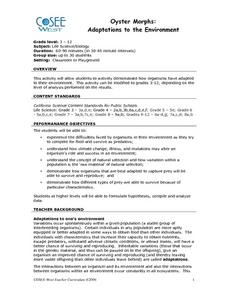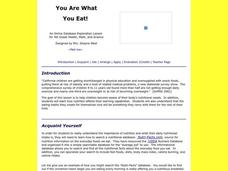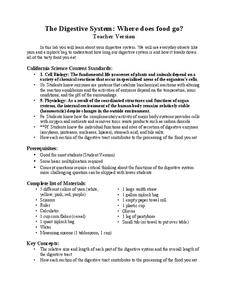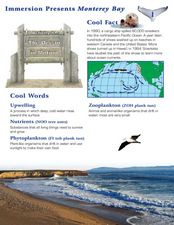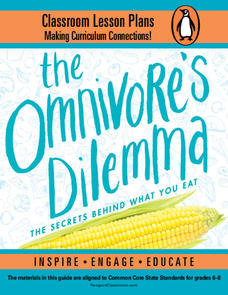Curated OER
Ecology - Food Chains
Students discuss the concept of a food chain in the California ecosystem. in this food chain lesson, students look at different cards and sort them into herbivores, carnivores, decomposers, and omnivores. Then they use these cards to...
Curated OER
Construction of Food Chains and Tracing Energy Changes
If you need a few basic activities for teaching food chains to your emerging ecologists, here they are. Three sheets of organism cards are included for learners to cut out and arrange according to trophic relationships. To make the most...
Channel Islands Film
Human Impact on the Food Web of Santa Cruz Island
What happens when a non-native species is introduced onto an island? Santa Cruz Island, part of the Channel Island chain located off the coast of southern California, provides the perfect laboratory for young environmental scientists to...
Curated OER
Sustainable Livestock
Students investigate healthy eating habits by researching livestock. In this food sustainability instructional activity, students research the negative impact factory farming has on our environment due to pollution. Students define...
University of California
You Are What You Eat: Testing for Organic Compounds in Foods
We have all heard that we are what you eat, but what are we eating? An informative lesson opens with a discussion of the foods pupils have recently eaten. Then, young scientists perform four experiments on seven different foods to...
Curated OER
Wetland Food Webs
Students study life science. In this food webs and food chains comparison lesson, students examine the wetlands to discover the relationships that exist between the animals that live there. They participate in group activities and...
Curated OER
Ocean Life Food Web
Students construct a food web representative of the Gulf of California. They use pictures to depict all of the organisms in the appropriate level of the web (producer, primary consumer, etc.)
Curated OER
Major Organic Acids in Fruits
Students investigate the organic acids present in a variety of juices. In this organic acids lesson plan, students read about the effects of organic acids in juices. They use paper chromatography to separate out the acids present in a...
Curated OER
Aquatic Food Webs
Learners discuss producers, herbivores, omnivores, carnivores, and decomposers and analyze the difference between food chains and food webs. They participate in a food web yarn game, examining what can effect the breakdown of the web.
Curated OER
Field Trip to the Watsonville Wetlands
Students explore the differences between food webs and food chains. In this wetland lesson students play a food web game and go on a scavenger hunt.
Curated OER
Oyster Morphs: Adaptations to the Environment
Students demonstrate how organisms adapt to their environment. They examine prey and predators, natural selection, and adaptations by representing oyster morph.
University of California
Energy and Biomass Pyramids
Young scientists play tag as they act out the food pyramid in the ocean ecosystem. Energy circles pass from the smaller prey to the predators and at the end of the activity, a data chart and analysis questions allow pupils to apply their...
Curated OER
You Are What You Eat!
Fourth graders discover the nutritional needs of their bodies. Using a database, they research how nutrition affects their learning capabilities. They take the food they eat on a daily basis and discover its nutritional value. They...
LABScI
The Digestive System: Where Does Food Go?
Would you believe that your digestive system stretches to five times your height?! Help your pupils to understand this relationship as they work through the laboratory exercise. The first instructional activity of a 12-part series is a...
California Academy of Science
Composting: A Scientific Investigation: California Academy of Sciences
Garbage, recycle, compost: Does it really matter where we put our trash once we are done? By making detailed observations over seven weeks, kids will see which materials break down naturally to become a healthy part of the soil, and...
Curated OER
Monterey Bay
Students read background information about Monterey Bay, California, and conduct related experiments. In this ocean in motion lesson, students read information about the location, wildlife, and characteristics of Monterey Bay. They...
Curated OER
Eat Your Plants
Students explore fruits and vegetables. For this fruits and vegetables lesson, students work in small groups investigating plant parts. Students discover that fruits and vegetables originate from different parts of plants.
Curated OER
What's Bugging You?
Students examine the effects of pests on other organisms, crops, and the environment. they construct an insect observation chamber and discover how some insects can be pests in some situations and beneficial in others. They write "pest...
Curated OER
Marine Protected Areas (MPA)
Ninth graders explain the purpose of MPA's. In this biology lesson plan, 9th graders identify MPA's in Southern California. They simulate coastal sampling using candy from two buckets. Students analyze their results and share it with the...
Agriculture in the Classroom
"Steer" Toward STEM: Careers in Animal Agriculture
Think like an engineer and an agricultural scientist over the course of 12 lessons in a STEM based unit. Young scientists take on the roles of animal physiologists, animal geneticists, agricultural engineers, animal nutritionists, and...
Penguin Books
The Omnivore’s Dilemma, Young Readers Edition
As the saying goes, you are what you eat. A useful set of lesson plans encourage young readers to take a second look at their eating habits. Pre- and post-reading questions bring in reflective writing and discussion while extension...
LABScI
Acids and Bases: Cabbage Juice pH Indicator
Explore the range of pH using an assortment of household liquids. Scholars create their own pH indicators from cabbage and determine the pH of several liquids. To further their exploration, individuals use the same liquids to create...
Curated OER
Estuaries, Estuarine Habitats, and Adaptations
Students conduct research on estuaries. They design and construct an estuary, describe the physical characteristics of an estuary, and create a diagram illustrating an estuarine food web.
Curated OER
Sea Connections
Young scholars, after locating different marine habitats on a globe, play a card game about ecosystems, food webs and organisms.












